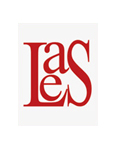-
Dr. Ismail Serageldin
The Radical Challenges University Education Will Face and How It Needs To Be Transformed.
+
The world is moving rapidly towards the knowledge-based society and the technologically-based economy, with the well-known and well-documented aspects of globalization overlaid on this transformation. Here I refer to the structure and presentation of knowledge and how we humans will most likely be interacting with knowledge, whether we are academics or researchers or simply the descendants of those who used to go to public libraries and ask the librarian for assistance with a good book to read or a reference source for the paper they are preparing for college.
This knowledge revolution shall have profound implications for the institutions of education from kindergarten through post-doctoral levels, research, whether public or private, and the cultural institutions that support our knowledge structure such as libraries, archives and museums. My presentation will focus on some major issues that will be thoroughly discussed before sketching out some recommendations that will help lay the foundations for a proper response to a rapidly changing world.
The major issues to be discussed are: The Seven Pillars of the Knowledge Revolution; Reinventing education; the University Yesterday and Tomorrow, and ten Aspects of the Higher education System in the 21st Century. -
Dr. Helen Abadzi
Basic research skills for graduate studies in education: Old problems and new methods.
+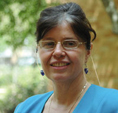
Educational researchers are expected to test hypotheses through robust research designs and provide answers to problems that are often fairly important. However, students often fail to learn the relevant skills and therefore cannot rise to the circumstances. One issue is a lack of mathematical and statistical preparation needed to handle research designs. Another is a limited understanding of hypothesis testing.
Often this topic is discussed in formal terms in research courses. Implicit hypotheses are rarely dealt with, so graduates often test the wrong concepts and come up with invalid answers. Yet a third problem is a limitation on the methods that can be used to answer educational questions.
Cognitive neuroscience permits insights in educational outcomes that are simply not obtainable by paper-and-pencil or survey methods. Yet, Arab universities often have limited capacity to teach these to students. The presentation show concrete examples and offer some suggestions for improvement.
Abstracts
-
Dr. Abed El Latif Kidai
Trends in Research and Formation in the Education Department in Rabat, Morocco(Arabic presentation)
+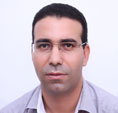
This study aims at exploring the state of research at the Faculty of Education, Mohammed V Souissi University, Rabat. Adopting a case study approach, the study specifically analyses the evolution of theses and dissertations since the birth of the Faculty using quantitative and qualitative data (General orientations, study programmes, research themes and topics, length and scope, languages used) combined with some basic variables (Type of degree, year of defence, gender, etc.).
Adopting a grid, the analysis consists in a thorough survey of titles for the purpose of identifying major research trends as well as inconsistencies and hurdles.
The study shows that, in addition to the issue of quality, there is a wide gap between research carried out at the Faculty in terms of themes and topics, and the real educational concerns of the country.
This, against government expectations and investment, is clearly manifested in the quality of graduates and researchers as measured by indicators adopted in the current study. -
Dr. Maguy Chataoui
Contributions of Masters and Ph.D. Programs in the development of Arabic language didactics in Arab Universities(Arabic presentation)
+
The following paper will cover the prevailing research tendencies in Arabic language didactics in Arab universities: the research methodology required for a research theses; the research writing required when working on a research thesis and more specifically the ability to write an abstract; the different topics covered in theses and their relevance in light of the problems encountered when teaching/learning Arabic;
the shape of Arabic language didactics -as described by research topics- and its relevance when it comes to the demands of working in the field; the level of compliance of master students' skills with the standards of college research; the extent to which the covered topics are addressed, as well as the skills students possess in order to make use of future research and contribute to the progress of language didactics then ensure the socio-pedagogical relevance of these researches. Our research makes use of the SHAMAA database and will examine 253 research theses and 40 research abstracts. -
Dr. Suzanne Abou Rjeily; Mrs. Josette Haddad; Dr. Yvette El Gharib
Encadrement de mémoires et de thèses à la FS de l'éducation/USJ: quels dispositifs? quels effets? (French presentation)
+

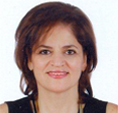
Based on a matrix suggested by Brown and Atkins, where the research supervision is considered from a dual perspective, relational and organizational, this study is limited to the relational dimension of the student-researcher supervision, with a focus on the "containing" function of the supervisor.
Thus, the research aims at identifying the most suitable supervision style adopted by the supervisors at the Faculty of Education in Saint-Joseph University that would contribute to enable the student in building a sufficiently positive relation with the different components in his academic process, and to finish his studies. This study is a case study, restricted in this phase to the students' point of view, and that might be broadened later on to involve other stakeholders in the Faculty of Education, and other Faculties and universities. The approach is quantitative and the research team adopted the survey as a tool.
The results showed that the participative and collaborative supervision style supports the student in achieving a genuine research path, and that the student's success depends on the supervisor style and the organizational and professional requirements to implement an authentic scientific research. -
Dr. Jari Lavonen
PhD Education in Educational Sciences in Finland: Systematic Development of the Programmes
+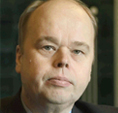
PhD education in the educational sciences, teaching and supervision, studies and quality control in Finland are described. First, the aim and basic processes of the PhD studies are briefly introduced with the focus on educational sciences. Second, the development of the studies is outlined. From 1995 to 2013, a national network-type graduate school system, financed by the Ministry of Education, was implemented and operated.
Beginning in 2014, the resources for organising PhD studies will be allocated to the universities. Third, the structure and practices of PhD education in science and mathematics education research is described and analysed as an example. -
Dr. Joseph Jabbra

The goal of a doctoral research program is to prepare the next generation of leading education researchers. The cornerstone of the doctoral experience is the research apprenticeship that all students undertake. This presentation highlights the characteristics of American doctoral programs focusing on the aim, processes and organization of the programs of study which view students as essential partners in developing new knowledge. -
Dr. Ramzi Salamé
PhD Programs in Education in Canadian Universities

This communication presents the essential features of Canadian doctoral programs in education focusing on their aims, admission requirements, curricula, students' supervision arrangements, required qualifications for the pursuit of studies, and graduation requirements. -
Dr. Theodore Hanf
Germany: PhD without a PhD Programme
+
Germany's universities have conformed to the Bologna system with its school-like bachelor and master programmes. However, "Bologna" uniformity does not (yet) rule the doctoral level.
The titles of Dr.phil., Dr. paed., Dr.jur., or Dr. theol. are obtained upon presentation of a thesis proving that the candidate is able to independently pursue research and to present new insights. Faculties accept as doctoral candidate (Doktorand) a student who has obtained a good (summa or magna cum laude) master's degree or an equivalent diploma and – more importantly, an agreement with a professor to act as an advisor (traditionally called "Doktorvater" or "Doktormutter". The thesis will be examined and graded by a committee appointed by the faculty which normally includes the advisor and defended by the candidate at a public disputation. The doctor degree is awarded once the thesis is published.
There are a few universities that run "graduate colleges" which provide doctoral students with courses beyond the M.A. programme and with more intensive advice and scrutiny of ongoing research by staff and fellow students. However, a majority of faculties resists a Bologna formula for the doctoral level, insists on a university not "in loco parentis" and maintains the idea that a doctoral thesis should be written "in solitude and freedom". -
Ms. Fatima Awada
Reconsidering Quality of Theses/ Projects in terms of Innovative Topic Choice: A case study of a university in Lebanon
+
The topic of trends in educational research has been widely debated in the education field in the Arab world with scholars and associations including but not limited to the UNDP, UNESCO, The World Bank, Muhammad Faour, and Al-Rashdan. However, the published articles have not addressed the issue of the topics graduate students select for their theses.
In this paper, the researcher investigated the quality of the research topics graduate students choose for their theses based on innovative topics in their field.
The methodology followed a case study research design that sampled 48 Masters level students and faculty from an American style university in Lebanon. In this study, the researcher closely looked at students' perceptions towards quality and educational trends, faculty's advising and perceptions of quality (mainly topic choice), and at the latest topics being researched by students in order to show the divergence between what is being taught, the latest trends and the students' decisions when thinking about a research topic.
The results reveal that student's perception of the issue of trends in education lies in the local context only rather than internationally. Moreover, faculty members are aware of the challenges of quality and are working to create a mechanism to improve the process. The study sheds new light on the little recognized issue of quality and value added considering the topics and innovation of the students' theses in educational research -
Ms. Samar Kassar; Ms. Sahar Chaer
Understanding the Graduate Journey
+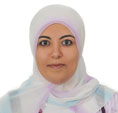
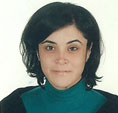
The doctorate degree pursuit is one of the most challenging endeavors in students' academic life. Although each doctoral student has a unique academic experience, common basic requirements are needed to guarantee a quality study to all students, with satisfaction being the pillar for the degree completion. However, our doctoral experience was a grueling journey; we have and still face numerous challenges emanating from the ways the program functions.
This study presents a profound exploration of the Doctoral Education Program at the Lebanese University. It aims at describing the program's design, planning, and implementation from the students' perspective. It also identifies and describes the challenges experienced by the enrolled students; the strategies followed to persist in the program; and the students' views of the measures needed to improve the quality of the doctoral studies experience.
This paper adopts a case study design and follows the qualitative method. It uses narrative inquiry which is a story-based research approach assuming that human beings rationalize random experiences by imposing a story structure on them. Data is collected first, through our reflective observations of weekly multi-disciplinary sessions, conferences, workshops, and general meetings, and second, through focus group interviews with enrolled students and with the program director; and last through document analysis of relevant policies and procedures. -
Ms. Mira Alameddine
The Making of a Good PhD Program
+
Pursuing a PhD at the Lebanese University (LU) is very demanding and as a candidate, the researcher is facing a lot of obstacles due to the program's lack of clear criteria and transparent process which constitute two of the criteria of a good program. To investigate if a PhD program follows internationally acceptable standards, assessors should look into several other factors such as research skilled courses, core courses, qualified faculty and facilities and research methods provided for the candidates (Sanders, 2012; Pre-Grad program, 2013).
This study investigated the PhD program at the Doctorate School of Literature, Humanities and Social Sciences at the Lebanese University from the perspective of the PhD candidates and highlighted the problems the program faces due to the lack of definite criteria and program assessment. A questionnaire was distributed to the PhD candidates and informal interviews were conducted to collect the data.
The researcher used the analysis of literature review to base her evaluation of the program. The study reveals that the PhD program lacks clear criteria and faces problems such as preparing adequate researchers and providing research related courses. Recommendations were provided in the end. -
Dr. Reda Hachem
The State of Educational Research in the Masters and PhD Programs in Ain Shams University (Arabic presentation)
+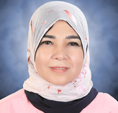
The current research aims to identify the reality of educational research and trends in MA Theses and PhD dissertations in the field of Education at the College of Girls, Ain Shams University during the period of 2000 - 2010. The research adopted the Bibliometrics approach and the method of discourse analysis.
Results showed that:
1) the majority of the MA theses and PhD dissertations were the works of Egyptian researchers, and had dealt with various issues and specialties whereas theses and dissertations prepared by Arab non-Egyptian researchers tackled administrative issues;
2) field research were the most common among the theses, and the descriptive approach and its quantitative tools were mostly used at the expense of interviews, observations, content analysis and other methods;
3) different kinds of administrative leaderships were among the most targeted groups in theses and dissertations studied during the period of the study;
4) the least studied groups were people with special needs in addition to other groups;
5) administrative problems, reform and development were the most common issues in the educational Masters and PhD in the field foundation of education during the study. -
Dr. Adnan El Amine
The Sociology of Educational Research (Essay on Teachers topic) (Arabic presentation)
+
Studies dealing with educational research in the Arab countries focus usually on its constraints and problems, and reiterate the same solutions. They use a normative approach. Some studies claim that educational research is separated from society. The paper tries to prove the opposite. In fact, educational studies lean to avoiding government related and politically sensitive issues, and avoid analyzing official documents.
These are some of the results which came out from the analysis of the titles of 2329 studies stored in Shamaa database by 22/9/2013 and dealing with teachers' topic.
The second part of the paper focuses on the research methods used by a sample of 184 Masters and PhD thesis documented in Shamaa. It classifies them into three categories:
1) those which are analytical and addressed to scientific community.
2) Those which fall under "abstracted empiricism" of W.R. Mills, they are primarily concerned with statistical processes and correlation at the expenses of knowledge contribution. The paper assumes that their authors choose the shortest way to obtain the diploma and imitate their advisors who publish for promotion using the same methodology.
3) Those which identify with the social actor, such as the expert, the inspector, and the administrator by making a normative discourse supported by empirical data.
Based on the distribution of these categories the paper concludes that the main function of the theses in our countries is socialization, while contributing to knowledge development is very marginal. -
Dr. Reima Al-Jarf
Arabic Education Electronic Databases: Current Status and Future Perspectives (Arabic presentation)
+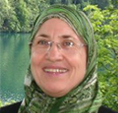
The study investigates the availability of Arabic education electronic databases that index research articles, books, journals, conference proceedings, dissertations and others, at higher education institutions, organizations and research centers in the Arab world.
The study examines the content of available databases to find out the following: Types of resources indexed; how the digital content is accessed; breadth of coverage (geographical area, years, periodicals and number of articles covered); fields and subfields searched; searching and narrowing options (by subject, author, keywords, title, abstract, publication type and date); searching methods (simple, advanced, Boolean, truncation); availability of search help on the screen, display options (citation, abstract, full text); accuracy and relevance of search results, and kinds of technical problems encountered by graduate students in searching, accessing and retrieving the content. The study reports results and gives recommendations for improvement to support flexible, quick and in-depth searching of different fields. -
Mrs. Rita Maalouf
Developing the culture of documentation and research in the field of education (Arabic presentation)
+
The presentation provides the rationale for initiation of the Arab Educational Information Network - Shamaa as a pioneering database and as a unique experience in the field of documenting educational studies in the Arab countries. It also elucidates Shamaa's objectives established after identifying the needs of the Arab educational community concerning the use of academic databases both in terms of collecting and retrieving data.
The presentation also describes the role that Shamaa plays in providing international exposure to the studies available in its database, and in providing access to educational studies conducted in and about the Arab world. Based on the above, the presentation calls for the need to combine efforts to ensure the continuity of Shamaa database in the Arab world. -
Mrs. Randa Al-Chidiac
Anti-Plagiarism Strategies
+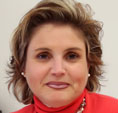
The advent of the availability of academic resources in electronic format has made plagiarism easier than ever and a horror to faculty members. The role of the Web has aided in the increase of plagiarism. With just a few mouse clicks, it is much easier now for students to copy and paste paragraphs or even entire essays. It is now more important than ever to be aware of cyber-plagiarism and how to prevent it.
Student should be encouraged to value their assignments and research products by doing their own work. By employing a few strategies the increasing amount of plagiarism on research papers can be combatted. -
Ms. Nadia Hashem Hasan
Testimonial from Cairo University (Arabic presentation)
+Science is a journey to the unknown, to knowledge; this journey may be hard or it may be joyful, and a journey to knowledge for a professional researcher is always an adventure as it stems from doubts and questions about an issue or phenomena, not knowing the answers until the journey's end. Those answers may be satisfactory to his questions or they may be shocking as they reveal a different vision than the researcher's expectations and the aim of his research or what he intends to prove.
Here, I find that sharing my personal experience in a scientific research journey is a duty that ethics oppose in order to enable my colleagues to benefit from it. I used the narrative approach as one of the qualitative research methods that are suitable for the educational field; it depends on storytelling based on personal experience in order to learn from indirect similar experiences. Using the narrative approach I tried to present the most important difficulties facing the Arab researchers and specially the Egyptians during their work in the research institutes or in the research community as well as in the used methodology, these difficulties and others weaken the personal and social benefits of the scientific research and hinders the educational researcher from continuing his research journey passionately and successfully. -
Mr. Ali Abdulla Abu Nawas
Testimonial from Jordan University (Arabic presentation)
+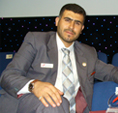
I started the journey of preparing my thesis by specifying my advisor first, then writing my proposal which included the problem statement, the purpose, the importance, the methodology and the references of the study. It was then submitted to a specialized jury at the level of the department, gaining the acceptance it has been then submitted to another jury of specialized experts at the level of the faculty.
Being accepted by the faculty, it has been submitted to the deanship of scientific research where it has been officially accepted and a minimum period of eight months was devoted to the research.After all of these procedures, I started writing my thesis which equals eighteen administered hours. Start from the beginning the researcher faced many difficulties including the busy schedule of the supervisor, the lack in the resources devoted for supporting the scientific research and the lack of support by the community of the research. -
Mr. Samer Ghamroun
Testimonial from Ecole normale supérieure in Cachan, France (Arabic presentation)

Samer Ghamroun will present his experience as a PhD candidate in social sciences in a French university. What are the conditions to start a PhD? What is the best way to get a fellowship? What kind of relation do students in France have with their advisors? How do they contribute to the scientific life of their department? Are teaching and publications necessary to achieve a "good" PhD? Other issues related to the academic life in France will also be discussed. -
Ms. Lara Badre
Testimonial from the University of Paris Descartes (Paris V)

The presentation deals with enrolling in a Ph.D. program in France. It highlights the different phases of the enrollment procedure starting from establishing contacts to finding an advisor for the thesis, finding and selecting a lab and then enrolling in the Ph.D. program. The presentation is a testimonial that stresses the importance of finding the suitable educational program that meets the candidates capabilities and needs in terms of training and education and future professional plans.



